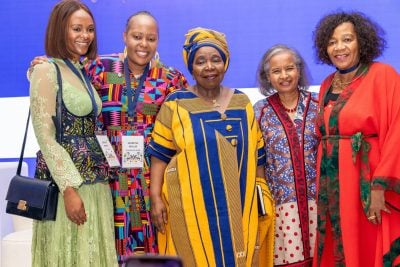Nunu Ntshingila is the regional director of Facebook Africa. She previously built brands for global advertising agency Ogilvy, heading its South African office. She tells us what brands mean for a company like Facebook
You’re a tech company that is part of everyday life, consumed more than any other brand daily. Yet in our surveys, when people think of a brand they think Coke, Nike or MTN. How does Facebook see itself as a brand and how important is branding to a tech company like yours?
Facebook’s business model puts people first, and so does our brand. Our brand is unique in the sense that its mission is to empower people to share ideas, find communities and make meaningful personal and business connections. In a young and vibrant region like Africa, it means that we give people the opportunity to be the architects of a new narrative for the continent. This is the most powerful brand building and we’re passionate about what our platform is enabling.
In November last year, we introduced a new corporate branding with a new company logo distinguishing the Facebook company from the Facebook app. The new branding aims at providing more clarity and is a way to better communicate our ownership structure to the people and businesses who use our services. We began including “from Facebook” within all our apps as we believe people should know which companies make the products they use.
The overall move reflects the need for the Facebook company to have its own voice and narrative because the issues we are dealing with and talking about are different to the Facebook individual app. Our brand is designed to help us better communicate our purpose as a company.
What does your brand stand for?
We are driven by five principles that we stand for and hold deeply.
The first is to “give people a voice”. We strongly believe in a world where everyone gets an equal chance to be heard, where people have the power to communicate across borders and cultures and where they can organise around causes that matter to them. That’s the world we stand for and that’s what we’re trying to build every single day.
The second is to “serve everyone”. Our business model is ads so that we can make technology accessible to everyone.
The third is to “promote economic opportunity”. Facebook levels the playing field to help small businesses get off the ground. Entrepreneurs can create a Facebook page or an Instagram account and reach anyone with their idea, even if you don’t have a lot of money. That’s something that hasn’t really been possible before and it happens millions of times a day with more than 140m businesses using our platforms.
The fourth is to “build connection and community”. People use our apps to be closer to the people they care about but also build communities and start movements that lead to real change.
And finally, it is to “keep people safe and protect privacy”. We are committed to making Facebook a safe place and protecting personal privacy and information. We take this responsibility seriously.
You’re present in most countries around the world and most in Africa. Do you have to adjust the brand to different markets?
Facebook’s mission is clear: To give people the power to build community and bring the world closer together. Our mission in Africa is no different to what it is elsewhere in the world. Our branding remains the same. No matter where you are you will see the same Facebook – this is important to us as a global platform.
However, Africa is made of a variety of countries and cultures. The content that we see on our platforms reflects this unique diversity. Moreover, we are constantly connecting, listening and learning from all communities on the ground, whether it is startups, developers or advertising agencies to better serve them.
There are still many challenges that remain in the region, Africa is currently the least connected continent, with just over a quarter of its 1.3bn people connected to the internet. We know there is no silver bullet for addressing this challenge. We have a multi-faceted approach ranging from Facebook Lite – a standalone app that uses less data, saves space on your phone, and works well across all network conditions, even 2G; deploying cutting edge Wi-Fi technology on Goree Island in Senegal or leading African and global operators to build 2Africa, the most comprehensive subsea cable to serve the African continent and Middle East region.
What is the African experience of Facebook; what does it tell you about our continent, about what we like, what we consume, what we aspire to?
The future of Africa is young. In 2025, as most of the world begins to age, the African region will grow younger to become a quarter of the world’s most digitally active population. Our platform reflects the youthful spirit that drives Africa.
With the boom of social media, social commerce has grown simultaneously, redefining how brands approach their customers. Some of these brands are largely online and have carried the aspirations that are driving the increased consumption.
Everywhere in the region digital platforms have been a great catalyst for an inspiring transformation that has enabled the rise of African brands. For the first time, they can reach customers they didn’t have access to before and sell their goods locally and globally. It’s amazing to see how social media has enabled African brands to thrive.
Your community is a global one. What is the opportunity for brands to move from being local to becoming global, using your platforms, Facebook, Instagram and Whatsapp?
Year after year, we see small businesses accomplish more than ever before, whether it’s finding new customers, hiring employees or engaging with their communities. Small business becomes big business on Facebook and tiny companies get the type of global reach that used to be only available to the biggest companies.
Our platforms present huge opportunities for brands to scale and export their locally produced products to the world. Two-thirds of small businesses on Facebook say they’ve increased sales because of Facebook. This matters because when small businesses grow, they create jobs and fuel the economy.
Trust has been central to the Facebook story the last few years. Can you tell us a little bit more about what trust means for Facebook and the importance of trust in branding in general?
We know we have to earn back people’s trust. That’s why we have made improvements to better protect your privacy. We have become more transparent to ensure people can trust us with their information – and we know we have a deep responsibility to protect it.
In May, we announced the first members of the Oversight Board, implementing a new system for content governance and enforcement. The Oversight Board reflects a wide range of views and experiences and will exercise independent judgment over some of the most difficult and significant content decisions. This adds to our continuous efforts, with the introduction since 2013 of our Facebook transparency reports which give our community visibility into how we enforce policies, respond to data requests and protect intellectual property. Keeping information safe comes before anything else.
This leads us back to putting people first. We need to do three things: make sure you feel comfortable sharing on our apps; have quality content – including relevant ads – that you want to engage with; and give you full control over your information.
If people don’t feel like Facebook is a good use of time, they won’t use it. And if they leave Facebook, so will our advertisers. That’s why we need to put people first. Our bottom line is getting this right for people.
Nunu Ntshingila announced that she would be stepping down from her role on 1 July 2022.
Want to continue reading? Subscribe today.
You've read all your free articles for this month! Subscribe now to enjoy full access to our content.
Digital Monthly
£8.00 / month
Receive full unlimited access to our articles, opinions, podcasts and more.
Digital Yearly
£70.00 / year
Our best value offer - save £26 and gain access to all of our digital content for an entire year!
 Sign in with Google
Sign in with Google 



